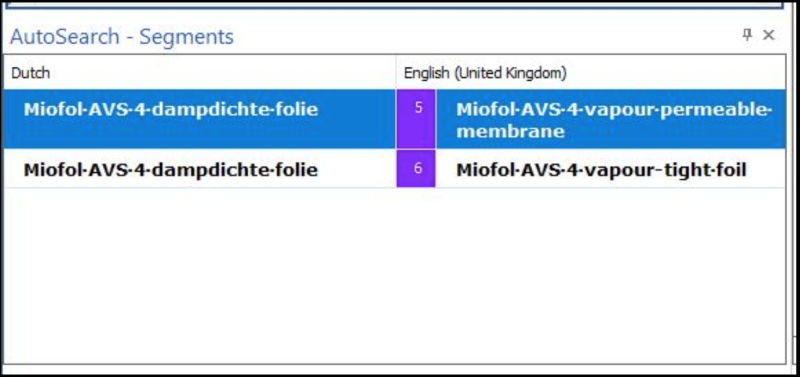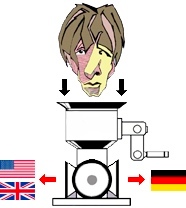| Pages in topic: < [1 2 3 4] | Has using DeepL become the norm? How to calculate PEs? Thread poster: dieuebersetzung
|
|---|
Jo Macdonald 
Spain
Local time: 00:35
Italian to English
+ ...
| DeepL ain't good enough for me | Jul 19, 2021 |
For a simple, widely-used term where the English abbreviation is already used in the Italian "Collaudo in fabbrica (FAT)" DeepL suggests "Factory Testing (FAT)".
This might look OK and be good enough for some, but even if you don't know the terminology, a quick look/check shows FAT is obviously Factory Acceptance Testing, and the most relevant part of that is "Acceptance" Testing, whereas for DeepL FAT is just factory acceptance or testing done in the factory; it is of course, testi... See more For a simple, widely-used term where the English abbreviation is already used in the Italian "Collaudo in fabbrica (FAT)" DeepL suggests "Factory Testing (FAT)".
This might look OK and be good enough for some, but even if you don't know the terminology, a quick look/check shows FAT is obviously Factory Acceptance Testing, and the most relevant part of that is "Acceptance" Testing, whereas for DeepL FAT is just factory acceptance or testing done in the factory; it is of course, testing done in the factory for the purpose of acceptance.
The results of a quick search on Linguee are actually much better than DeepL.
If you're using DeepL and want to do a proper job, be aware it's not that good and beware that it will probably look good enough and create confusion. Imo if you're earning twice as much as usual or taking half the time using DeepL you're probably working to a lower standard than usual, if your usual is what I would call quality translation.
I agree with people saying MT doesn't save time, it's just another tool. If you want to produce a good, quality translation you need to either know whether the MT content is right and take the time to judge that, or search to confirm the suggested term.
Reference
Factory acceptance testing
Acceptance testing conducted at the site at which the product is developed and performed by employees of the supplier organization, to determine whether a component or system satisfies the requirements, normally including hardware as well as software.
https://en.wikipedia.org/wiki/Acceptance_testing
https://www.google.com/search?q=Factory%20Acceptance%20Testing%20(FAT)%20&sxsrf=ALeKk02H4psGHQcXORskSJXOew3qviXTVQ:1626683191041&ei=Nzf1YMzlAdPKgwe6xaNY&oq=Factory%20Acceptance%20Testing%20(FAT)%20&gs_lcp=Cgdnd3Mtd2l6EAMyBAgAEBMyCAgAEBYQHhATMggIABAWEB4QEzIICAAQFhAeEBMyCAgAEBYQHhATMggIABAWEB4QEzIICAAQFhAeEBNKBAhBGABQwaEuWMGhLmDLqS5oAHACeACAAZkBiAHrAZIBAzEuMZgBAKABAqABAaoBB2d3cy13aXrAAQE&sclient=gws-wiz&ved=0ahUKEwiM3Y2O2-7xAhVT5eAKHbriCAsQ4dUDCA4&uact=5
https://www.deepl.com/translator?utm_source=lingueebanner1&il=en#it/en/Collaudo%20in%20fabbrica%20(FAT)
[Edited at 2021-07-19 09:56 GMT]
https://www.linguee.com/english-italian/search?source=auto&query=Collaudo%20in%20fabbrica%20(FAT)
[Edited at 2021-07-19 10:05 GMT] ▲ Collapse
| | | | | MT produces errors all the time | Jul 19, 2021 |
Jo Macdonald wrote:
For a simple, widely-used term where the English abbreviation is already used in the Italian "Collaudo in fabbrica (FAT)" DeepL suggests "Factory Testing (FAT)".
This might look OK and be good enough for some, but even if you don't know the terminology, a quick look/check shows FAT is obviously Factory Acceptance Testing.
DeepL et al. produce garbage all the time. Especially in short segments, like 'Seals:', 'Lager:' (where you get Arctocephalus pusillus in technical documents or beer or warehouses instead of bearings).
But ... that's not the point.
Professional translators can use MT to increase their productivity, to find inspiration, to improve their skills. Their aim is not to let the machine do all the work. No way.
No professional translator would blindly take every first target term from the dictionary and use it. Neither would she blindly use every suggestion from DeepL et al.
And this is why one should never use MT to translate complete texts in one run. Using MT only makes sense at a segment level, where you compare your own mental translation with several suggestions from different MT systems and other automated resources like TMs and auto-assembling.
| | | | Jeff Whittaker 
United States
Local time: 18:35
Spanish to English
+ ...
| How Should Machine "Translation" Tools Be Inteigrated into Professional Translation | Jul 19, 2021 |
Full article: https://www.languagecrawler.com/2021/04/a-state-of-flux-difficult-and.html
Excerpt: "The world of translation is in a state of flux. To the untrained, monolingual eye, machine translation seems like a miracle and it’s difficult to make clients understand just what could go wrong when they see what to them looks like an almost-finished... See more Full article: https://www.languagecrawler.com/2021/04/a-state-of-flux-difficult-and.html
Excerpt: "The world of translation is in a state of flux. To the untrained, monolingual eye, machine translation seems like a miracle and it’s difficult to make clients understand just what could go wrong when they see what to them looks like an almost-finished product. But the machine doesn’t translate in the sense that it comprehends the input and reprocesses the text into another language with the same meaning. Instead it provides what looks like a translation.
It’s important to understand how the machine arrives at this illusion in order to properly understand the effort required to turn this illusion into a true translation and why reduced rates don’t make sense for a freelance translator." ▲ Collapse
| | | | | Very good points in this article | Jul 19, 2021 |
Well worth reading. The fact that MT results of dubious quality are posted on the net more and more means that MT contaminates its own training data. That will be a limiting factor for any MT that does not even try to actually understand the source text. (And beside that, MT output also starts to contaminate our everyday language, introducing more and more false friends and unnatural wording into our natural language.)
| | |
|
|
|
Tony Keily
Local time: 00:35
Italian to English
+ ...
| I can't agree with this | Jul 20, 2021 |
dieuebersetzung wrote:
This is not about using an online dictionary vs. a hard copy or about using MT to help unscramble a sentence...
It's about having a 50 page document that would take 7 days to translate using human translation vs. no time with MT and then maybe a day's work for PE.
Translators have been the victims of technological change for years, with online markets used to drive a race to the bottom and CAT tools often used dishonestly to lower rates. My rates have been pretty much frozen for 15 years and my EU institutional work pays 40% less than 15 years ago in the name of "competitiveness". So if something has come along that might help redress that situation, even for a little while, it's good news.
Although of course it's not, since in a couple of years "translation" will be 95% MTPE thanks to DeepL and the agencies pocketing the fattened margins certainly won't be protesting on these forums! Speaking of which, for every dishonest translator passing off raw MT output as translation (if your translators are really doing this, they can't have been very good or reliable to begin with), there are five agencies dishonestly passing off MTPE jobs as reviewing, revision and the ubiquitous "proofreading". (None of the aqencies seems to know the difference between these terms.)
As to your point:
As has been pointed out elsewhere, Deepl or other MT apps are simply tools that translators can use. In my experience, far from helping to do massive amounts of work in "no time", using DeepL doesn't actually save any considerable amount of time at all if it's used properly, although it can aid the translation process and it can help produce much higher standard work by freeing up those valuable extra minutes for tweaking style and checking.
It can also make possible work of an acceptable level where deadlines are very tight and where I would say the time saved by the translator can be offset, in terms of value, against the urgency of the service request.
Finally, there are many areas in which DeepL and its like are less than useless: accounting and financial texts dealing with specific types of financial product, litigation, and so on.
[Edited at 2021-07-20 10:34 GMT]
[Edited at 2021-07-20 10:35 GMT]
[Edited at 2021-07-20 10:37 GMT]
[Edited at 2021-07-20 10:38 GMT]
| | | | | ‘Nice’ example | Jul 28, 2021 |
Hans Lenting wrote:
The thing is, that even a target segment that describes exactly the opposite of the source, can sound valid.
Jenny Zonneveld https://www.proz.com/profile/1542616 posted this example at Facebook of MT gone wrong. First translation by DeepL, second one by Google Translate:

[Edited at 2021-07-28 07:16 GMT]
| | | | | | kd42
Estonia
Local time: 01:35
English to Russian
| There are better MT packages on the block | Aug 2, 2021 |
And this is why one should never use MT to translate complete texts in one run. Using MT only makes sense at a segment level, where you compare your own mental translation with several suggestions from different MT systems and other automated resources like TMs and auto-assembling.
I have been using MT for decades, it is a good tool if you know how to use it. I agree, that doing a big chunk at a time is pointless, because you skip the "teaching" phase... See more
And this is why one should never use MT to translate complete texts in one run. Using MT only makes sense at a segment level, where you compare your own mental translation with several suggestions from different MT systems and other automated resources like TMs and auto-assembling.
I have been using MT for decades, it is a good tool if you know how to use it. I agree, that doing a big chunk at a time is pointless, because you skip the "teaching" phase. I did a couple of jobs using "neural engines" -- the MT which learned from my corrections on its own. The results were very good. The quality was good, the rates were lower, the turnaround was higher, the fatigue was lower, the hourly earnings were higher. I would guess a subscription of a neural MT will be widespread among freelancers quite soon. ▲ Collapse
| | |
|
|
|
Kristina Love wrote:
This discussion has been a real eye-opener for me as someone new to the profession.
I don't think there's any question that what the OP experienced, just as he described it (and I do not get the impression that he is mistaken or exaggerating), was very unprofessional, lazy, sloppy work at best and fraud at worst. If DeepL was utilized for the translation and only 10% of it was edited to make it different, there is simply no way in the world that a quality translation was produced. That is to say, it might turn out "OK" for some practical purposes, but that doesn't really matter. What the client is paying for (whether the translator charges a low rate or a high rate) is the translator's very best effort to produce the highest quality translation that they personally can possibly render.
However, I'm with the people who say that as long as the translation is of high quality (and I would add, that it is of the highest quality that the translator in question is capable of producing, giving sufficient time, attention, and care to their work), it shouldn't matter which tools they used along the way.
I think the OP has very valid reason to feel cheated in this instance. For me it's a shocking story, because it sounds like these were translators who were not just some fly-by-night "randos" but rather people he had trusted in the past, or at least who had proven years of experience as well as excellent marketing, and possibly other impressive credentials. This is not what I expected to hear, and I now realize I need to adjust my view of the people who appear to be the "ideal" translators and seem to have it all. I guess all that glitters is not gold.
Maybe these were well-intentioned people who mismanaged their time by mistake and took on too many jobs at once and found themselves in a very unfortunate predicament that sadly led to some corner-cutting and ethical compromises. We don't know what is going on with them - did they get greedy accept too much work, or were they experiencing dire financial problems? I don't want to judge them, but what they did, they shouldn't have done, and should never repeat it.
This thread has revealed that there isn't much agreement about how editing and MTPE rates, or translating with memory tools, or translating with the assistance of machine translation, or with CAT tools, should be priced.
Adieu and others already pointed this out, but I feel it really needs to be stressed: I think the OP has a few misconceptions of all the differences between these scenarios and what kind of work goes into each one. Is the OP a translator himself in addition to being/working for an agency?
It's so important to be knowledgeable about this and to have clear communication and mutual understanding between client and translator before the project starts. I recommend Corinne McKay's book "How to Succeed as a Freelance Translator."
A CAT tool, or translation environment tool, can be used with or without translation memory (not the same as machine translation), and with or without machine translation. And of course translations can be carried out without a CAT tool. In addition, as I believe a few others pointed out, Machine Translation Post-Editing is when the client gives the translator a project that has already been translated by a machine and then the translator "fixes it." If any kind of editing is done, it needs to be specified and agreed on: will the translator be editing a translation by looking at both source and target, or just the target? And will extensive revisions be necessary, or is it something that is practically ready and just needs to be proofread for minor mechanical errors?
Corinne McKay's book says that in general, the price charged for editing should be about a quarter to a third of what is charged for translating. I want to follow all of the advice in that book, but this one is a little difficult for me as I can see how "editing" is a broad term and may involve work that is almost or just as hard as translating.
I don't think there is anything wrong with using any and all tools. They can be used wisely, or they can be misused. Not wanting a translator to use a particular tool can somewhat be compared to insisting that they not use dictionaries or reference books, or insisting that they write it by hand instead of type. It may sound silly but it's the same principle. The tools are there to help create the best final product possible. With a difficult or lengthy project, I have noticed that using MT can even act as insurance against my own mistakes. If the machine suggests something I don't expect, it jumps out and catches my attention, and then I can focus in on determining whether it's the machine or my own understanding that's at fault. And yes, it DOES save time, but let's be clear: I'd probably spend a whole 7 days at least on a 50 page project even with MT. As a matter of fact, for any project, I'd use all the time that I had left until the deadline, regardless of what tools I was using, because the goal is to make it the absolute best it is within my power to make it. Every word of every sentence needs to be second- and triple- and quadruple-guessed, and more if time allows. The time that MT saves is time that can be re-invested back into refining the project and making it even better. At least 80% of the words need to be either reformulated or require time to research and confirm.
Some projects may be easier than that, and some translators may be faster and more efficient with this with more experience, but it doesn't change the basic fact that an honest and diligent translator with any kind of work ethic is going to spend a lot of time and effort on a translation, no matter what tools they do or don't use.
And it goes without saying this doesn't mean that translators don't have the right to rest, take care of themselves, have a personal life, or insist on a rate that they consider fair and worth their time and effort.
Thank you for your input.
Yes, I a also a translator and a proofreader. Of course it's not easy, no, it's impossible to give a fair rate for such work, as there are so many variables. Proofreading is the best example: I know many professionals who charge a fixed rate for that kind of work, yet there are texts that barely need touching and then there are texts that need to be rewritten entirely.
Also I have no problem whatsoever with TM, on the contrary. That goes without saying.
As you have mentioned yourself, this is just about people who just copy-paste a text into the free version of DeepL and then change it a little to correct mistakes (depending on the sort of text there are sometimes none) and disguise the origin. That's what I was really shocked to see people doing who are not open about it and charge the same as for a humans translation.
That was my point and I still see it that way.
| | | | Adieu 
Ukrainian to English
+ ...
| Yeah, this is getting ridiculous | Aug 4, 2021 |
Carelessness is proliferating.
I see far too many revision jobs or crap TM matches containing lovely MT-isms like "we hereby apply version/document ..."
Obviously SUBMIT/PROVIDE/ENCLOSE.
Lazy clowns... that's clearly not an honest human error, right? Just raw MT.
[Edited at 2021-08-04 15:12 GMT]
| | | | Yaotl Altan 
Mexico
Local time: 16:35
Member (2006)
English to Spanish
+ ...
German Dutch Engineering Translation wrote: Hans Lenting wrote:
The thing is, that even a target segment that describes exactly the opposite of the source, can sound valid. Jenny Zonneveld https://www.proz.com/profile/1542616 posted this example at Facebook of MT gone wrong. First translation by DeepL, second one by Google Translate:  [Edited at 2021-07-28 07:16 GMT]
Check the class GT also changes the gender of the (female) Portuguese writers. GT also changes the gender of the (female) Portuguese writers. 
| | | | | GT’s gender prefs | Aug 12, 2021 |
Yaotl Altan wrote: Check the class  GT also changes the gender of the (female) Portuguese writers. 
Recently there were lists at FB showing how GT links certain professions to specific genders.
| | |
|
|
|
Adieu 
Ukrainian to English
+ ...
| You guys are overthinking this | Aug 12, 2021 |
German Dutch Engineering Translation wrote: Yaotl Altan wrote: Check the class  GT also changes the gender of the (female) Portuguese writers.  Recently there were lists at FB showing how GT links certain professions to specific genders.
There is no "logic" module in most MT, it is pure statistical probability drawn from texts fed into the engine.
| | | | | Pages in topic: < [1 2 3 4] | There is no moderator assigned specifically to this forum. To report site rules violations or get help, please contact site staff » Has using DeepL become the norm? How to calculate PEs? | CafeTran Espresso | You've never met a CAT tool this clever!
Translate faster & easier, using a sophisticated CAT tool built by a translator / developer.
Accept jobs from clients who use Trados, MemoQ, Wordfast & major CAT tools.
Download and start using CafeTran Espresso -- for free
Buy now! » |
| | TM-Town | Manage your TMs and Terms ... and boost your translation business
Are you ready for something fresh in the industry? TM-Town is a unique new site for you -- the freelance translator -- to store, manage and share translation memories (TMs) and glossaries...and potentially meet new clients on the basis of your prior work.
More info » |
|
| | | | X Sign in to your ProZ.com account... | | | | | |








































